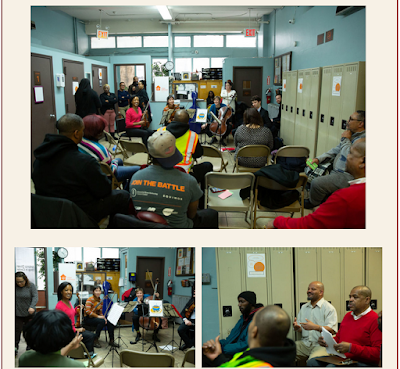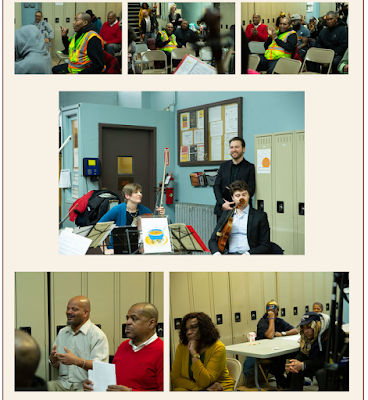|
|
|
|
116th Music Kitchen
February 20, 2020
Olivieri Center
Forgotten Voices Premiere #14
Featuring Gabriel Kahane “All Is Quiet”
Brahms Quartet No. 2 in A minor
Kelly Hall-Tompkins, violin
Ling Ling Huang, violin
Matthew Cohen, viola
Alexis Gerlach, cello
Jesse Blumberg, baritone
We
returned to the Olivieri Center this afternoon for our 14th Forgotten
Voices premiere. Unlike other performances where we had to wish for
more listeners to make their way to our performance, we walked into a
room filled with people. Sitting or laying their heads on every one of
the tables from the front to the back of the room, the heat, the
stillness of waiting and uncertainty was palpable.
We
went down to the basement with the still brand new-looking stylish
brown laminate flooring and cooler temperature to begin our rehearsal.
Just before the appointed hour of 2:30pm, we went back upstairs for our
performance. Everyone now before us had a look not of stillness, nor
displacement, but like they were just in the middle of something else
and took this moment out of the day for a concert. Like a mid-day
concert series you might see in a business or retirement community, but
here for a broader, less typical gathering across many walks of life.
There was the subway worker still wearing his yellow-orange work vest, a
lady who seemed a wise and learned grandmother, a man in a smart
sweater vest and nice pants who had perhaps just left the office, one
with a backwards cap who might have just finished a game of B-ball. The
“school teacher,” the “college professor”- lives paused and
anticipating of whatever we were offering. And unlike some previous
performances at this center, people were already engaged and watching
all the way to the back of the long building.
I
introduced Music Kitchen, members of our group and our first piece for
the day. As we near the end of the Forgotten Voices shelter premieres
in honor of Music Kitchen’s 15th year, it was a pleasure to turn once
again to the music of Brahms, a major source of inspiration in creating
the concept of Music Kitchen. I explained once again the theme devised
from Brahms’ F-A-E statement, “free but alone,” (frei aber einsam) as
well as his propensity for unrequited love and subsequent spelling of
the woman’s name “AGATHE” in a piece of music. The listeners were
already intrigued by this fallible human character Brahms and listened
with sharper ears.
We
began to play to this audience, already in more rapt attention than
some concert halls. And only about 10 or 12 bars in, Matt had to stop
as one of his strings went slack with the change in temperature from
downstairs. We came to a stop and before we could even get our
instruments down, “It sounds beautiful!” Came the exclamation from the
gentleman in the subway vest. I was happy to hear this unexpected early
feedback showing that he was already bonded to us and this experience.
After a brief tuning pause, we began again. By the end of the 1st mvt,
this time the same gentleman could no longer contain himself. Slack
jawed, “Woooooowwww!” came bubbling over the other responses. First, he
poignantly declared it “a duet of souls.” He then began an incredibly
exuberant play by play of what he had just seen and heard that would
have made ESPN proud- “First you were leading and the others were
following, but then you got mad and it switched to her leading, then
him, then he was leading, and you were all following, and then you all
got mad...and you couldn’t have messed up or that would have messed
everyone up...!” “Yes,” I chimed in with a chuckle, “you have just
described how chamber music works. The music is a dialogue with many
changing moods and we are indeed interdependent on each other to make it
work.”
The
others still sat in rapt attention but with this gentleman stepping
forward to hold the space with such exuberance, the others dared not
speak for a while. We played the slow movement and at the end, the same
gentlemen excitedly jumped in again. “Let me tell you a quick
story...”. By now the others were shaking their heads and rolling their
eyes with his frequent, exuberantly loquacious outbursts. A staff
member jumped in and said, “Mr. X, let them finish their performance!”
He continued but quickly wrapped up what turned out to be his
testimonial by saying that the pain he felt in his back from a fall is
now gone from being here and soothed by our performance. Another lady
whose warm focused eyes had seemed all along to want to spill her
thoughts, finally said, “This really is music of the soul.”
I
then turned to introducing Forgotten Voices- at the mere mention of the
name, one man already pinged with resonance, “Hmmm!” And when I
explained that no one had ever heard it before, that it was written for
them here today, there were numerous audible expressions of awe around
the room. I pointed out the window as I explained that we would be
taking their words straight to center stage at Carnegie Hall. Perhaps
this was a fact beyond conception because at this mention there was no
sound or movement in the room.
The
piece is rhythmically atmospheric, with subtle references to Ravel La
Valse, fitting for this imaginative text of being in “a grand ballroom.”
One lady said quietly that this piece transports her to another place,
saying that when you’re at a place like this that’s what you have to
do. She also said it told a story but without words. Jesse went
further with that idea, saying it is our job to tell a story through the
music. For another man, he felt it was “strong and robust.” I said,
and yet still it is reminiscent of French impressionist music in that
there are lots of little notes, like an impressionist painting, but that
when one stands back, the whole picture is revealed. The same lady who
had spoken before of a story also now declared the piece sexy, and
later proudly told me she is 71. She said the piece is sexy in part
because it has much subtlety and that we brought out. “We’ll definitely
have to tell Gabe that!” I said as we all shared a laugh.
Another
lady said the song reminded her of Luciano Pavarotti, which Jesse
quickly quipped, “I’ll take that as a compliment!” And we shared
another laugh. Another lady said that she is Italian and grew up with
classical because it was her parents love. She intimated that it wasn’t
for her back then but now today it really spoke to her. She said
poignantly that it reminded her of when your life turns upside down and
then gets back on track.
With
the audience’s permission, we did our now habitual second performance
of the new work. A man in the back spoke up for the first time. “What
genre is this?”
“Sounds so good man, I wish I had a surround sound system.” I pointed to the ensemble so close to him, saying, “You’ve got
a surround sound system!” Matt chimed in that this is “old-school
surround sound.” But I was glad he felt so close to the music and this
experience as to fantasize about a way to take the experience with him.
Before
we turned to our last movement of Brahms I asked if anyone had any
questions for us. A man said, “I want to learn to waltz.” “Oooh, I
said, this piece definitely inspires that!” I told him that that can be
the hobby that he works on, or rather, ‘the vision that transports
him,’ referring back to the lady’s earlier comment. And then the lady
who had already declared Brahms “music of the soul” now joyfully
bantered with us, “I take it you guys love Brahms!”
We
jumped into the dramatic last movement, with a respite of chorale-like
calm before the final blustery ending. We were greeted by an eruption
of applause, bravos and cheers. Right away, the super engaged subway
worker said, “Miss lady, you did your thing!” I replied, “Yes, we all
did our thing!”
When
I asked for any final questions, there was one potent question, “That
Carnegie concert- how can we get the information? ‘Cause I definitely
want to go- I won’t be here. I’m leaving soon.” I was thrilled to hear
the strong desire expressed regarding our concert. I also noted now
several times the clients who declare imminent plans for their lives
beyond the shelter, yet urgently wanting to know how to be part of Music
Kitchen's Carnegie premiere. I assured them that we want to invite
everyone here today who wants to come regardless of their place of
residence at that time. I asked that they let Urban Pathways staff know
and that even though it’s several months from now, and they may no
longer be here, we will figure out how to get them free tickets.
I
then invited those who wanted to be in the group photo with us to come
on up. The same subway-vested man, so engaged through every minute of
our performance now said, “Me, me, me, me, me!!!” in a high-pitched,
childlike voice, harkening back to another time, as he moved the chairs
to come forward. As the rest of the group was also moving towards the
front, the lady who had also spoken frequently during the performance,
came straight to me. She hugged me and introduced herself as Juanita.
She obviously came from an educated background, filled with school and
music lessons. She told me about her piano lessons as a child, “Mother
scared me all my life by saying ‘if you don’t have music in your life
you lose part of your soul.’ I never understood what she meant, but now
I do.” Not just from today, she clarified, but realizations in her
adult life and today’s concert were certainly powerful confirmation of
her mother’s words all those years.
















No comments:
Post a Comment